Ethical Leadership in SA 6 Cases of Unethical Leadership
VerifiedAdded on 2022/08/12
|11
|2445
|16
Assignment
AI Summary
ETHICAL LEADERSHIP: A STUDY ETHICAL LEADERSHIP: A STUDY 1 1 ETHICAL LEADERSHIP: A STUDY ETHICAL LEADERSHIP: A STUDY Name of the student Name of the university Author Note Introduction 2 Discussion 2 South African context 3 Literature Review 3 Possibilities of ethical leadership in SA 6 Cases of unethical leadership 6 Lessons learnt 7 Recommendations 7 Conclusion 8 Introduction Ethical leadership can be defined as leadership which is built on, and directed by ethical beliefs and values
Contribute Materials
Your contribution can guide someone’s learning journey. Share your
documents today.
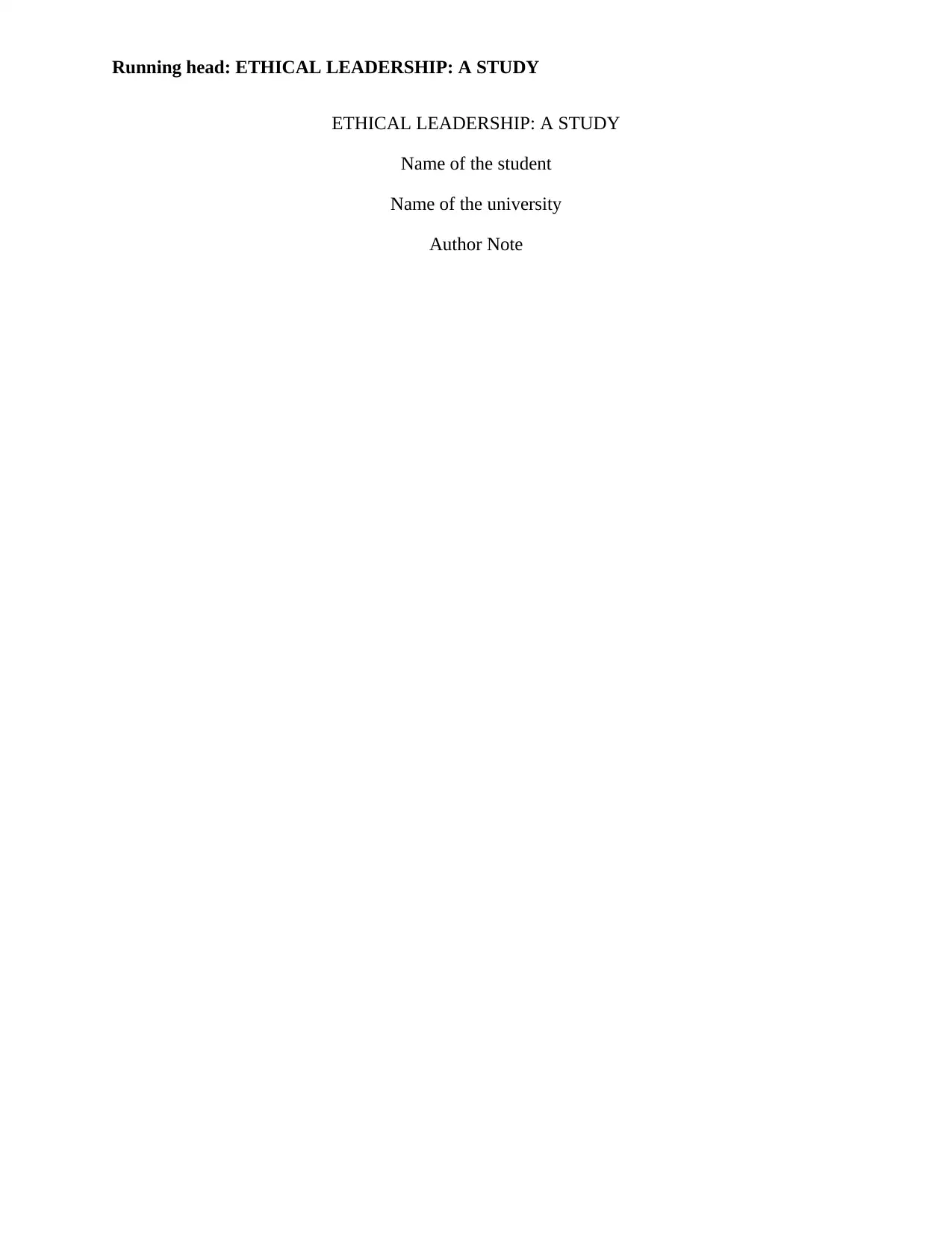
Running head: ETHICAL LEADERSHIP: A STUDY
ETHICAL LEADERSHIP: A STUDY
Name of the student
Name of the university
Author Note
ETHICAL LEADERSHIP: A STUDY
Name of the student
Name of the university
Author Note
Secure Best Marks with AI Grader
Need help grading? Try our AI Grader for instant feedback on your assignments.
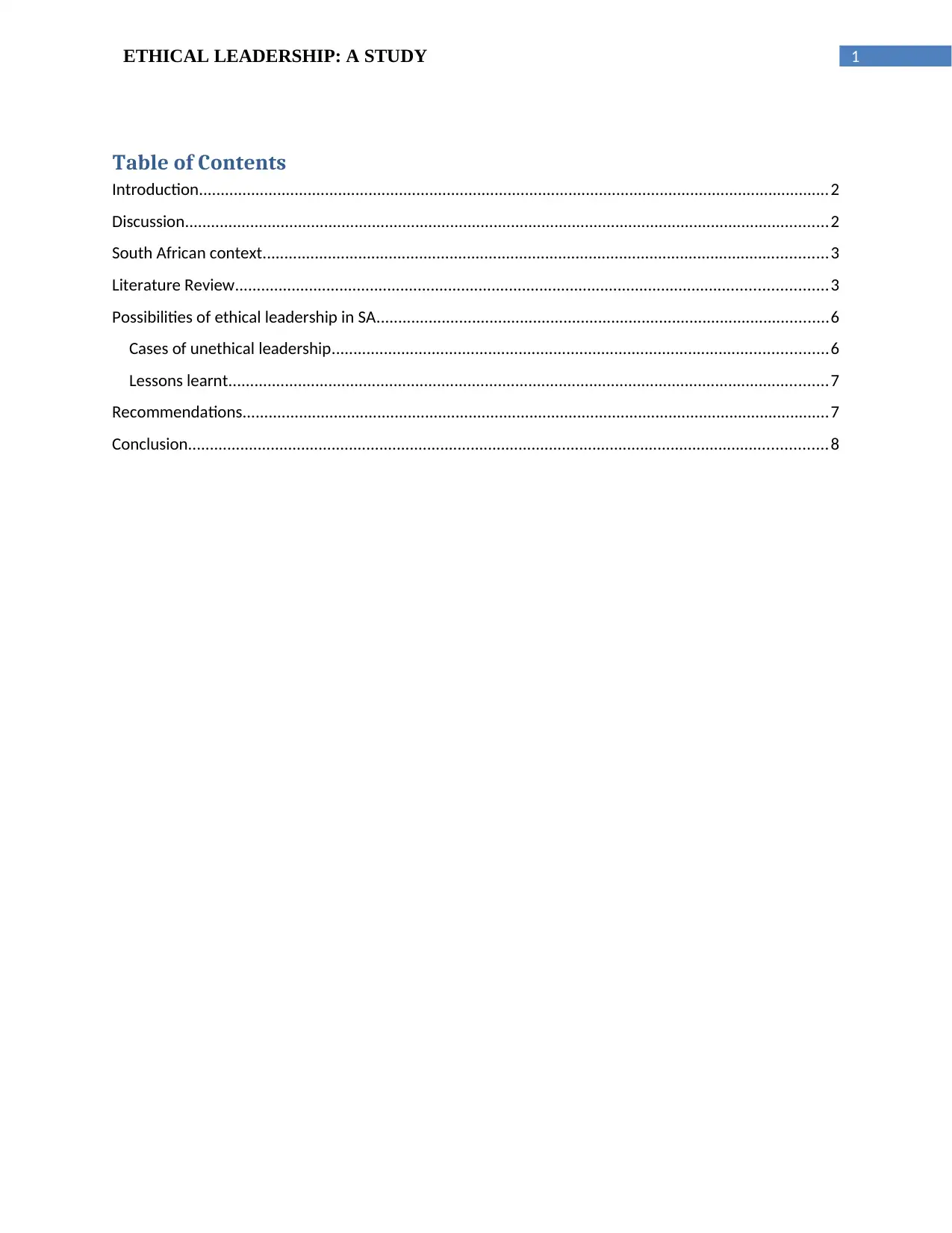
1ETHICAL LEADERSHIP: A STUDY
Table of Contents
Introduction.................................................................................................................................................2
Discussion....................................................................................................................................................2
South African context..................................................................................................................................3
Literature Review........................................................................................................................................3
Possibilities of ethical leadership in SA........................................................................................................6
Cases of unethical leadership..................................................................................................................6
Lessons learnt..........................................................................................................................................7
Recommendations.......................................................................................................................................7
Conclusion...................................................................................................................................................8
Table of Contents
Introduction.................................................................................................................................................2
Discussion....................................................................................................................................................2
South African context..................................................................................................................................3
Literature Review........................................................................................................................................3
Possibilities of ethical leadership in SA........................................................................................................6
Cases of unethical leadership..................................................................................................................6
Lessons learnt..........................................................................................................................................7
Recommendations.......................................................................................................................................7
Conclusion...................................................................................................................................................8
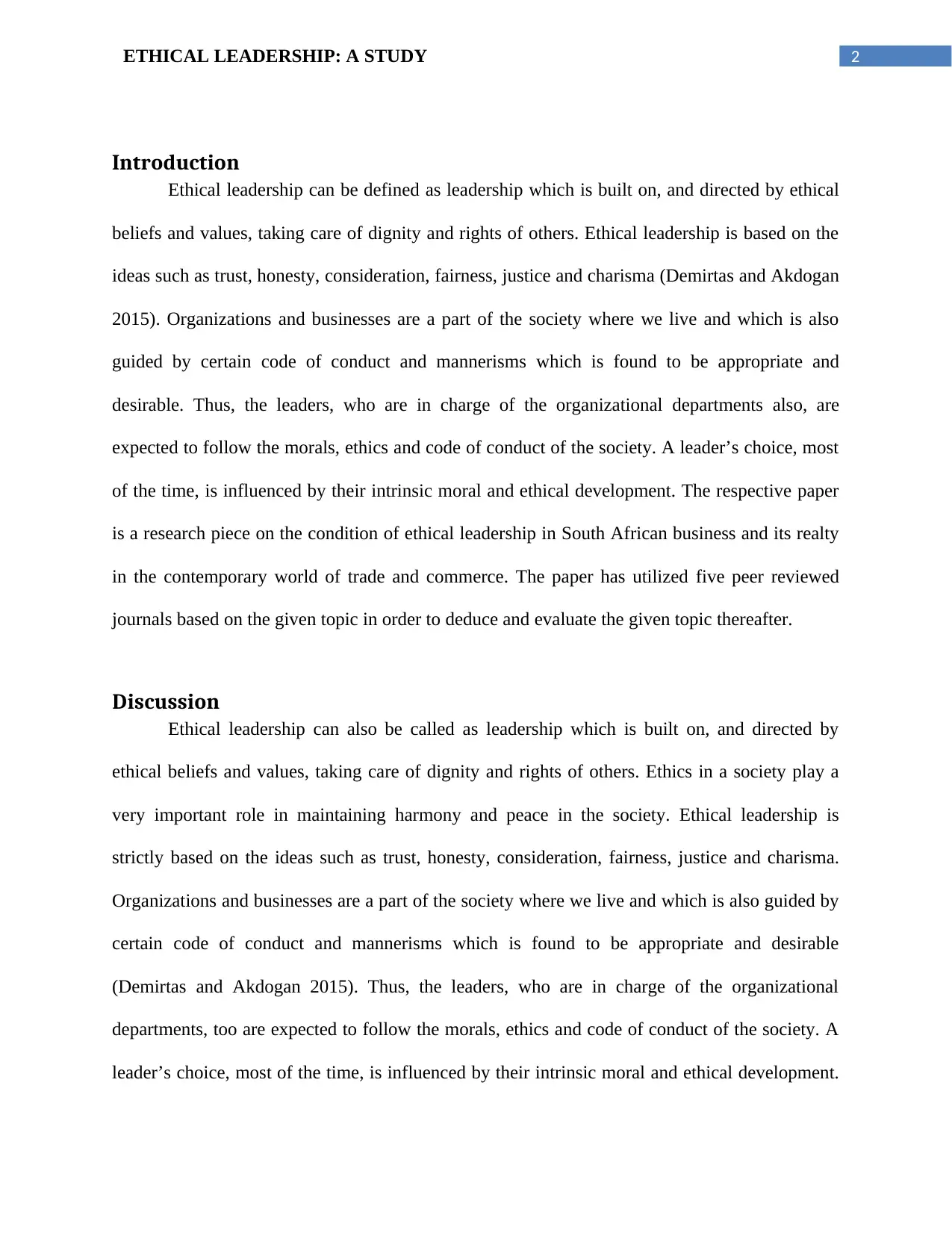
2ETHICAL LEADERSHIP: A STUDY
Introduction
Ethical leadership can be defined as leadership which is built on, and directed by ethical
beliefs and values, taking care of dignity and rights of others. Ethical leadership is based on the
ideas such as trust, honesty, consideration, fairness, justice and charisma (Demirtas and Akdogan
2015). Organizations and businesses are a part of the society where we live and which is also
guided by certain code of conduct and mannerisms which is found to be appropriate and
desirable. Thus, the leaders, who are in charge of the organizational departments also, are
expected to follow the morals, ethics and code of conduct of the society. A leader’s choice, most
of the time, is influenced by their intrinsic moral and ethical development. The respective paper
is a research piece on the condition of ethical leadership in South African business and its realty
in the contemporary world of trade and commerce. The paper has utilized five peer reviewed
journals based on the given topic in order to deduce and evaluate the given topic thereafter.
Discussion
Ethical leadership can also be called as leadership which is built on, and directed by
ethical beliefs and values, taking care of dignity and rights of others. Ethics in a society play a
very important role in maintaining harmony and peace in the society. Ethical leadership is
strictly based on the ideas such as trust, honesty, consideration, fairness, justice and charisma.
Organizations and businesses are a part of the society where we live and which is also guided by
certain code of conduct and mannerisms which is found to be appropriate and desirable
(Demirtas and Akdogan 2015). Thus, the leaders, who are in charge of the organizational
departments, too are expected to follow the morals, ethics and code of conduct of the society. A
leader’s choice, most of the time, is influenced by their intrinsic moral and ethical development.
Introduction
Ethical leadership can be defined as leadership which is built on, and directed by ethical
beliefs and values, taking care of dignity and rights of others. Ethical leadership is based on the
ideas such as trust, honesty, consideration, fairness, justice and charisma (Demirtas and Akdogan
2015). Organizations and businesses are a part of the society where we live and which is also
guided by certain code of conduct and mannerisms which is found to be appropriate and
desirable. Thus, the leaders, who are in charge of the organizational departments also, are
expected to follow the morals, ethics and code of conduct of the society. A leader’s choice, most
of the time, is influenced by their intrinsic moral and ethical development. The respective paper
is a research piece on the condition of ethical leadership in South African business and its realty
in the contemporary world of trade and commerce. The paper has utilized five peer reviewed
journals based on the given topic in order to deduce and evaluate the given topic thereafter.
Discussion
Ethical leadership can also be called as leadership which is built on, and directed by
ethical beliefs and values, taking care of dignity and rights of others. Ethics in a society play a
very important role in maintaining harmony and peace in the society. Ethical leadership is
strictly based on the ideas such as trust, honesty, consideration, fairness, justice and charisma.
Organizations and businesses are a part of the society where we live and which is also guided by
certain code of conduct and mannerisms which is found to be appropriate and desirable
(Demirtas and Akdogan 2015). Thus, the leaders, who are in charge of the organizational
departments, too are expected to follow the morals, ethics and code of conduct of the society. A
leader’s choice, most of the time, is influenced by their intrinsic moral and ethical development.
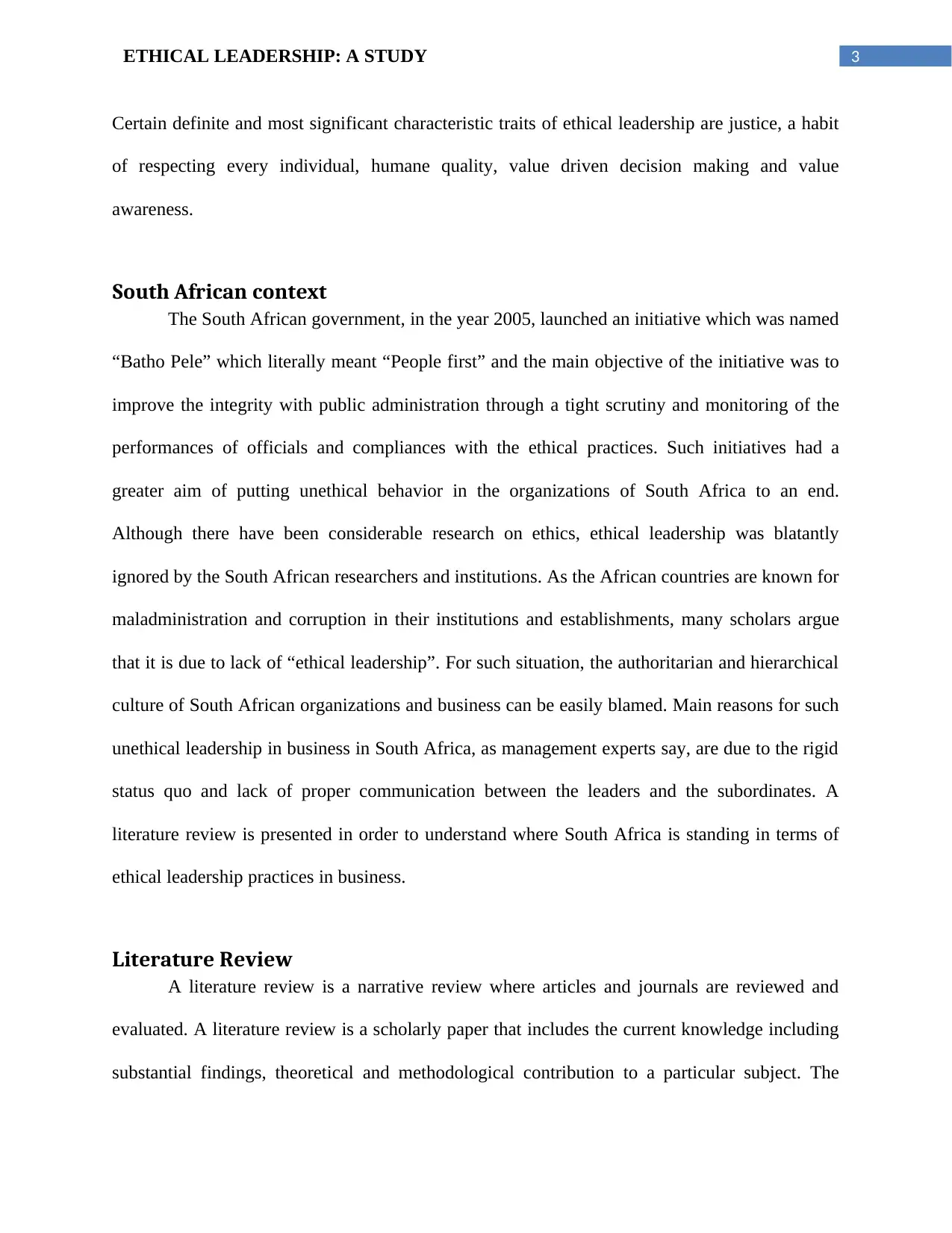
3ETHICAL LEADERSHIP: A STUDY
Certain definite and most significant characteristic traits of ethical leadership are justice, a habit
of respecting every individual, humane quality, value driven decision making and value
awareness.
South African context
The South African government, in the year 2005, launched an initiative which was named
“Batho Pele” which literally meant “People first” and the main objective of the initiative was to
improve the integrity with public administration through a tight scrutiny and monitoring of the
performances of officials and compliances with the ethical practices. Such initiatives had a
greater aim of putting unethical behavior in the organizations of South Africa to an end.
Although there have been considerable research on ethics, ethical leadership was blatantly
ignored by the South African researchers and institutions. As the African countries are known for
maladministration and corruption in their institutions and establishments, many scholars argue
that it is due to lack of “ethical leadership”. For such situation, the authoritarian and hierarchical
culture of South African organizations and business can be easily blamed. Main reasons for such
unethical leadership in business in South Africa, as management experts say, are due to the rigid
status quo and lack of proper communication between the leaders and the subordinates. A
literature review is presented in order to understand where South Africa is standing in terms of
ethical leadership practices in business.
Literature Review
A literature review is a narrative review where articles and journals are reviewed and
evaluated. A literature review is a scholarly paper that includes the current knowledge including
substantial findings, theoretical and methodological contribution to a particular subject. The
Certain definite and most significant characteristic traits of ethical leadership are justice, a habit
of respecting every individual, humane quality, value driven decision making and value
awareness.
South African context
The South African government, in the year 2005, launched an initiative which was named
“Batho Pele” which literally meant “People first” and the main objective of the initiative was to
improve the integrity with public administration through a tight scrutiny and monitoring of the
performances of officials and compliances with the ethical practices. Such initiatives had a
greater aim of putting unethical behavior in the organizations of South Africa to an end.
Although there have been considerable research on ethics, ethical leadership was blatantly
ignored by the South African researchers and institutions. As the African countries are known for
maladministration and corruption in their institutions and establishments, many scholars argue
that it is due to lack of “ethical leadership”. For such situation, the authoritarian and hierarchical
culture of South African organizations and business can be easily blamed. Main reasons for such
unethical leadership in business in South Africa, as management experts say, are due to the rigid
status quo and lack of proper communication between the leaders and the subordinates. A
literature review is presented in order to understand where South Africa is standing in terms of
ethical leadership practices in business.
Literature Review
A literature review is a narrative review where articles and journals are reviewed and
evaluated. A literature review is a scholarly paper that includes the current knowledge including
substantial findings, theoretical and methodological contribution to a particular subject. The
Secure Best Marks with AI Grader
Need help grading? Try our AI Grader for instant feedback on your assignments.
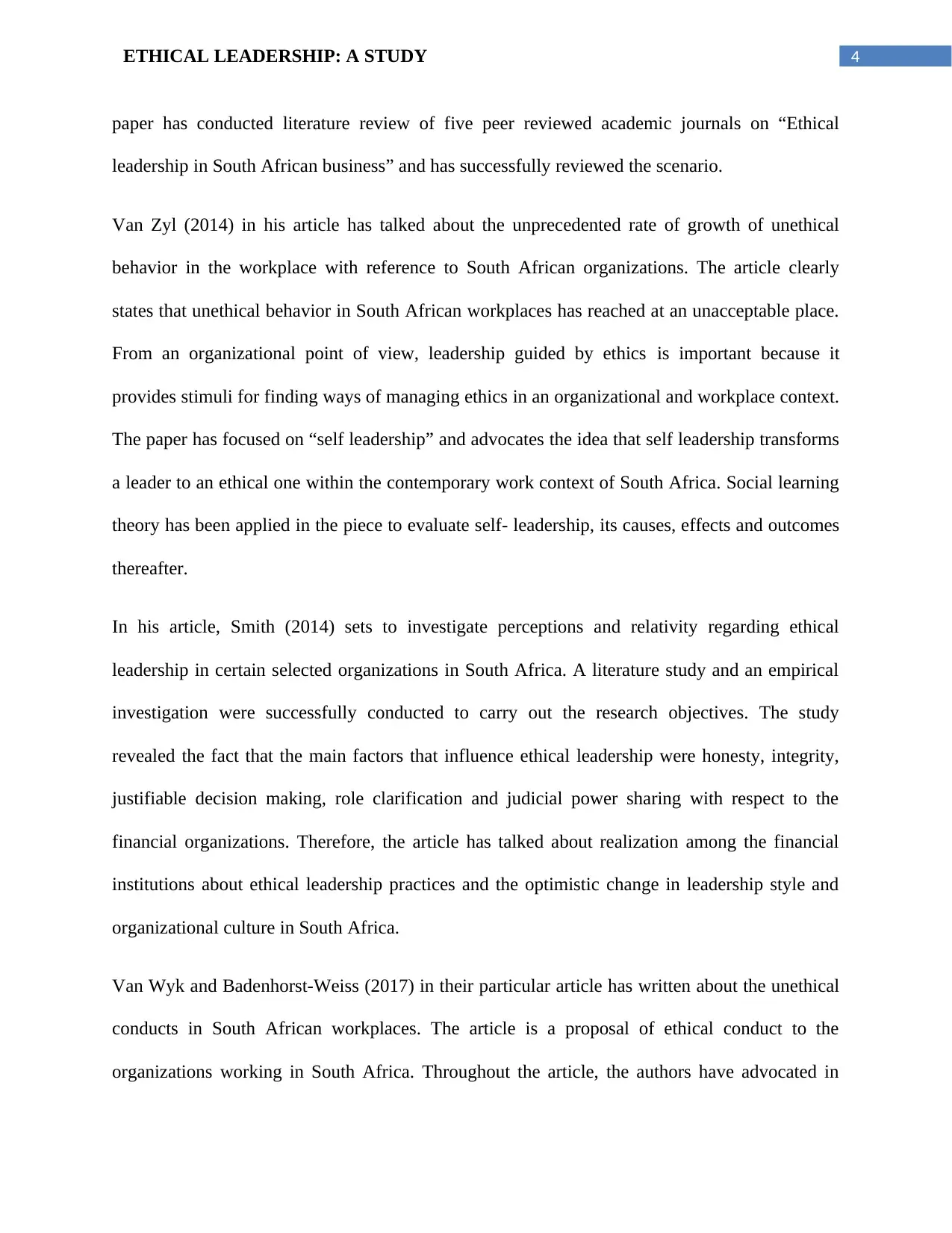
4ETHICAL LEADERSHIP: A STUDY
paper has conducted literature review of five peer reviewed academic journals on “Ethical
leadership in South African business” and has successfully reviewed the scenario.
Van Zyl (2014) in his article has talked about the unprecedented rate of growth of unethical
behavior in the workplace with reference to South African organizations. The article clearly
states that unethical behavior in South African workplaces has reached at an unacceptable place.
From an organizational point of view, leadership guided by ethics is important because it
provides stimuli for finding ways of managing ethics in an organizational and workplace context.
The paper has focused on “self leadership” and advocates the idea that self leadership transforms
a leader to an ethical one within the contemporary work context of South Africa. Social learning
theory has been applied in the piece to evaluate self- leadership, its causes, effects and outcomes
thereafter.
In his article, Smith (2014) sets to investigate perceptions and relativity regarding ethical
leadership in certain selected organizations in South Africa. A literature study and an empirical
investigation were successfully conducted to carry out the research objectives. The study
revealed the fact that the main factors that influence ethical leadership were honesty, integrity,
justifiable decision making, role clarification and judicial power sharing with respect to the
financial organizations. Therefore, the article has talked about realization among the financial
institutions about ethical leadership practices and the optimistic change in leadership style and
organizational culture in South Africa.
Van Wyk and Badenhorst-Weiss (2017) in their particular article has written about the unethical
conducts in South African workplaces. The article is a proposal of ethical conduct to the
organizations working in South Africa. Throughout the article, the authors have advocated in
paper has conducted literature review of five peer reviewed academic journals on “Ethical
leadership in South African business” and has successfully reviewed the scenario.
Van Zyl (2014) in his article has talked about the unprecedented rate of growth of unethical
behavior in the workplace with reference to South African organizations. The article clearly
states that unethical behavior in South African workplaces has reached at an unacceptable place.
From an organizational point of view, leadership guided by ethics is important because it
provides stimuli for finding ways of managing ethics in an organizational and workplace context.
The paper has focused on “self leadership” and advocates the idea that self leadership transforms
a leader to an ethical one within the contemporary work context of South Africa. Social learning
theory has been applied in the piece to evaluate self- leadership, its causes, effects and outcomes
thereafter.
In his article, Smith (2014) sets to investigate perceptions and relativity regarding ethical
leadership in certain selected organizations in South Africa. A literature study and an empirical
investigation were successfully conducted to carry out the research objectives. The study
revealed the fact that the main factors that influence ethical leadership were honesty, integrity,
justifiable decision making, role clarification and judicial power sharing with respect to the
financial organizations. Therefore, the article has talked about realization among the financial
institutions about ethical leadership practices and the optimistic change in leadership style and
organizational culture in South Africa.
Van Wyk and Badenhorst-Weiss (2017) in their particular article has written about the unethical
conducts in South African workplaces. The article is a proposal of ethical conduct to the
organizations working in South Africa. Throughout the article, the authors have advocated in
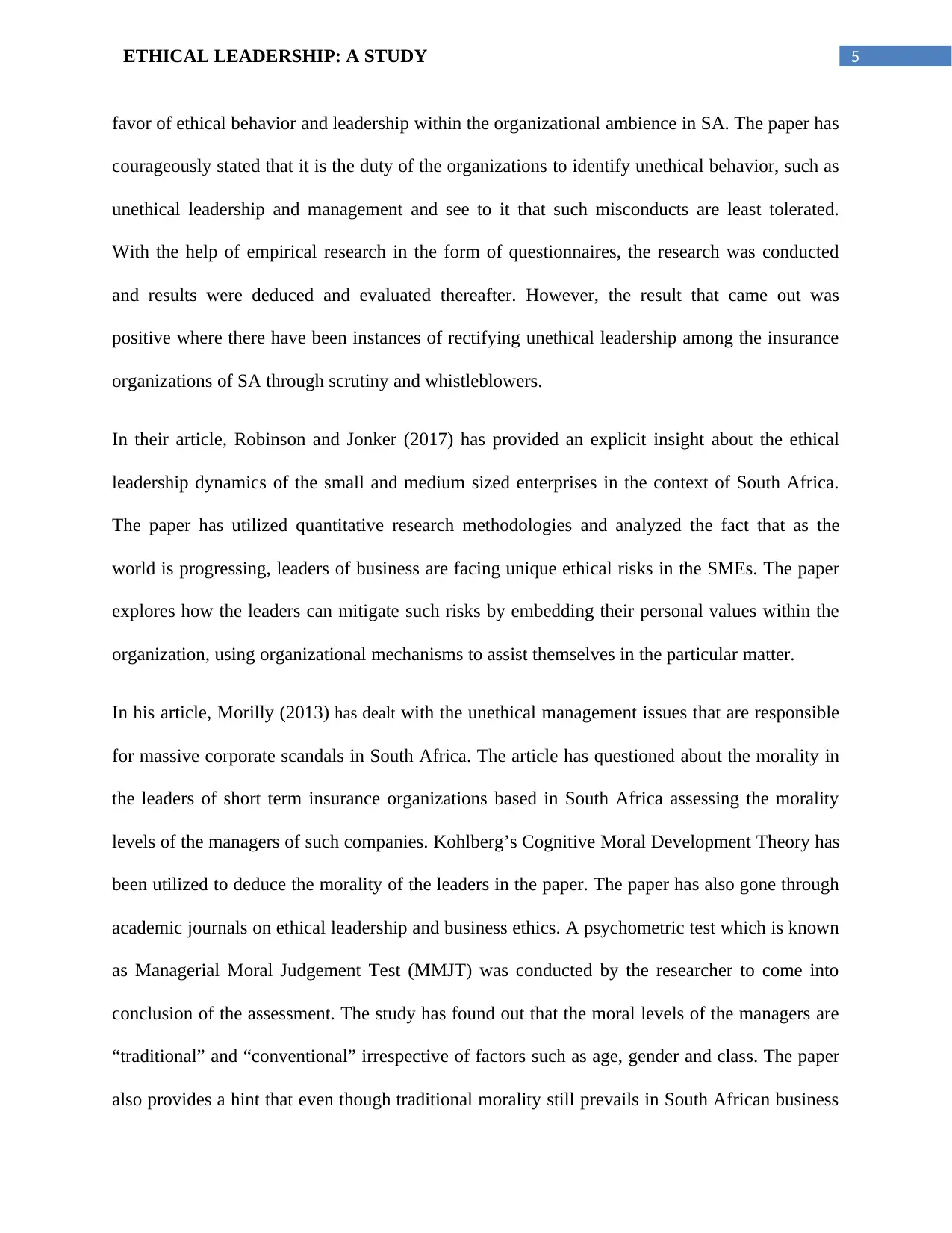
5ETHICAL LEADERSHIP: A STUDY
favor of ethical behavior and leadership within the organizational ambience in SA. The paper has
courageously stated that it is the duty of the organizations to identify unethical behavior, such as
unethical leadership and management and see to it that such misconducts are least tolerated.
With the help of empirical research in the form of questionnaires, the research was conducted
and results were deduced and evaluated thereafter. However, the result that came out was
positive where there have been instances of rectifying unethical leadership among the insurance
organizations of SA through scrutiny and whistleblowers.
In their article, Robinson and Jonker (2017) has provided an explicit insight about the ethical
leadership dynamics of the small and medium sized enterprises in the context of South Africa.
The paper has utilized quantitative research methodologies and analyzed the fact that as the
world is progressing, leaders of business are facing unique ethical risks in the SMEs. The paper
explores how the leaders can mitigate such risks by embedding their personal values within the
organization, using organizational mechanisms to assist themselves in the particular matter.
In his article, Morilly (2013) has dealt with the unethical management issues that are responsible
for massive corporate scandals in South Africa. The article has questioned about the morality in
the leaders of short term insurance organizations based in South Africa assessing the morality
levels of the managers of such companies. Kohlberg’s Cognitive Moral Development Theory has
been utilized to deduce the morality of the leaders in the paper. The paper has also gone through
academic journals on ethical leadership and business ethics. A psychometric test which is known
as Managerial Moral Judgement Test (MMJT) was conducted by the researcher to come into
conclusion of the assessment. The study has found out that the moral levels of the managers are
“traditional” and “conventional” irrespective of factors such as age, gender and class. The paper
also provides a hint that even though traditional morality still prevails in South African business
favor of ethical behavior and leadership within the organizational ambience in SA. The paper has
courageously stated that it is the duty of the organizations to identify unethical behavior, such as
unethical leadership and management and see to it that such misconducts are least tolerated.
With the help of empirical research in the form of questionnaires, the research was conducted
and results were deduced and evaluated thereafter. However, the result that came out was
positive where there have been instances of rectifying unethical leadership among the insurance
organizations of SA through scrutiny and whistleblowers.
In their article, Robinson and Jonker (2017) has provided an explicit insight about the ethical
leadership dynamics of the small and medium sized enterprises in the context of South Africa.
The paper has utilized quantitative research methodologies and analyzed the fact that as the
world is progressing, leaders of business are facing unique ethical risks in the SMEs. The paper
explores how the leaders can mitigate such risks by embedding their personal values within the
organization, using organizational mechanisms to assist themselves in the particular matter.
In his article, Morilly (2013) has dealt with the unethical management issues that are responsible
for massive corporate scandals in South Africa. The article has questioned about the morality in
the leaders of short term insurance organizations based in South Africa assessing the morality
levels of the managers of such companies. Kohlberg’s Cognitive Moral Development Theory has
been utilized to deduce the morality of the leaders in the paper. The paper has also gone through
academic journals on ethical leadership and business ethics. A psychometric test which is known
as Managerial Moral Judgement Test (MMJT) was conducted by the researcher to come into
conclusion of the assessment. The study has found out that the moral levels of the managers are
“traditional” and “conventional” irrespective of factors such as age, gender and class. The paper
also provides a hint that even though traditional morality still prevails in South African business
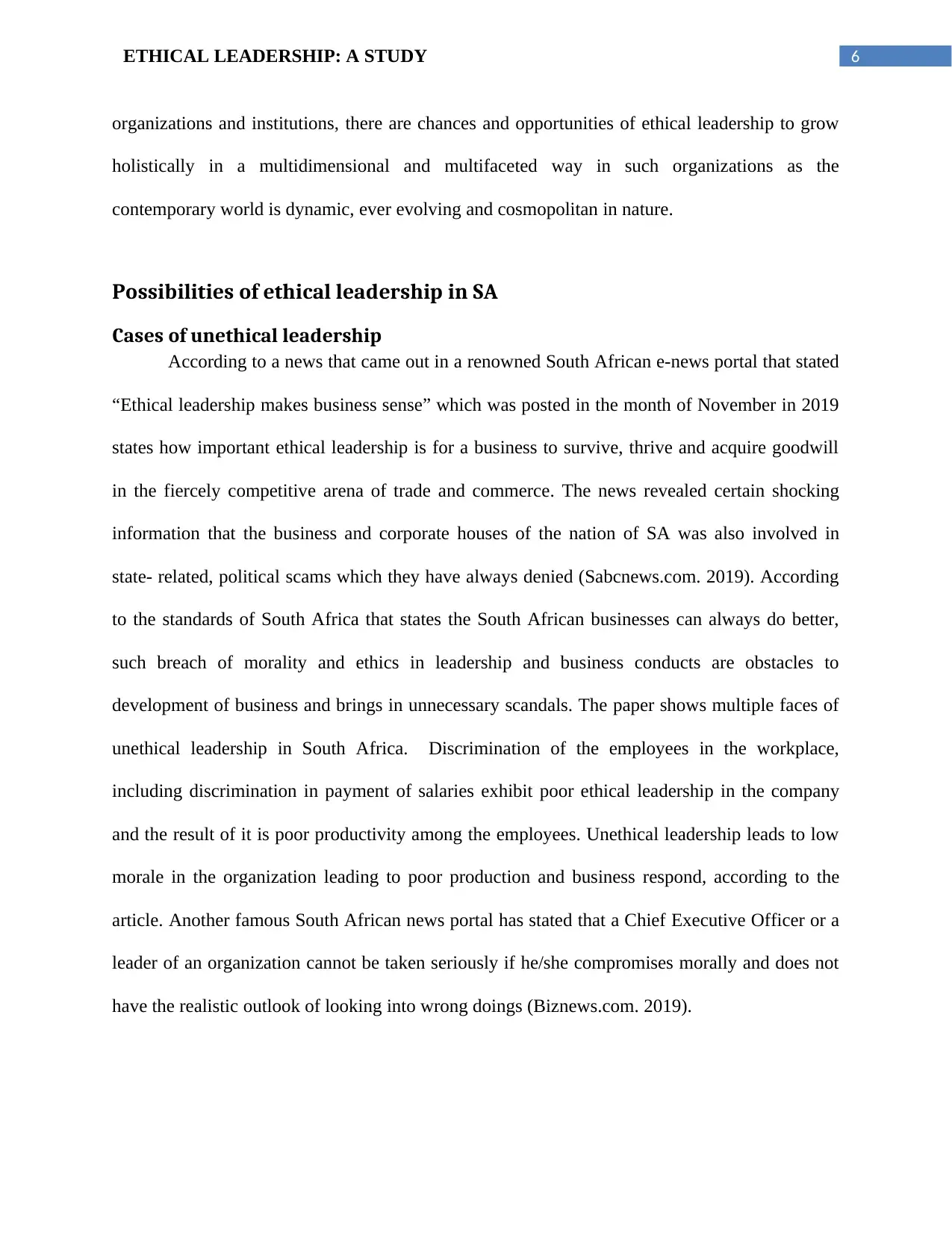
6ETHICAL LEADERSHIP: A STUDY
organizations and institutions, there are chances and opportunities of ethical leadership to grow
holistically in a multidimensional and multifaceted way in such organizations as the
contemporary world is dynamic, ever evolving and cosmopolitan in nature.
Possibilities of ethical leadership in SA
Cases of unethical leadership
According to a news that came out in a renowned South African e-news portal that stated
“Ethical leadership makes business sense” which was posted in the month of November in 2019
states how important ethical leadership is for a business to survive, thrive and acquire goodwill
in the fiercely competitive arena of trade and commerce. The news revealed certain shocking
information that the business and corporate houses of the nation of SA was also involved in
state- related, political scams which they have always denied (Sabcnews.com. 2019). According
to the standards of South Africa that states the South African businesses can always do better,
such breach of morality and ethics in leadership and business conducts are obstacles to
development of business and brings in unnecessary scandals. The paper shows multiple faces of
unethical leadership in South Africa. Discrimination of the employees in the workplace,
including discrimination in payment of salaries exhibit poor ethical leadership in the company
and the result of it is poor productivity among the employees. Unethical leadership leads to low
morale in the organization leading to poor production and business respond, according to the
article. Another famous South African news portal has stated that a Chief Executive Officer or a
leader of an organization cannot be taken seriously if he/she compromises morally and does not
have the realistic outlook of looking into wrong doings (Biznews.com. 2019).
organizations and institutions, there are chances and opportunities of ethical leadership to grow
holistically in a multidimensional and multifaceted way in such organizations as the
contemporary world is dynamic, ever evolving and cosmopolitan in nature.
Possibilities of ethical leadership in SA
Cases of unethical leadership
According to a news that came out in a renowned South African e-news portal that stated
“Ethical leadership makes business sense” which was posted in the month of November in 2019
states how important ethical leadership is for a business to survive, thrive and acquire goodwill
in the fiercely competitive arena of trade and commerce. The news revealed certain shocking
information that the business and corporate houses of the nation of SA was also involved in
state- related, political scams which they have always denied (Sabcnews.com. 2019). According
to the standards of South Africa that states the South African businesses can always do better,
such breach of morality and ethics in leadership and business conducts are obstacles to
development of business and brings in unnecessary scandals. The paper shows multiple faces of
unethical leadership in South Africa. Discrimination of the employees in the workplace,
including discrimination in payment of salaries exhibit poor ethical leadership in the company
and the result of it is poor productivity among the employees. Unethical leadership leads to low
morale in the organization leading to poor production and business respond, according to the
article. Another famous South African news portal has stated that a Chief Executive Officer or a
leader of an organization cannot be taken seriously if he/she compromises morally and does not
have the realistic outlook of looking into wrong doings (Biznews.com. 2019).
Paraphrase This Document
Need a fresh take? Get an instant paraphrase of this document with our AI Paraphraser
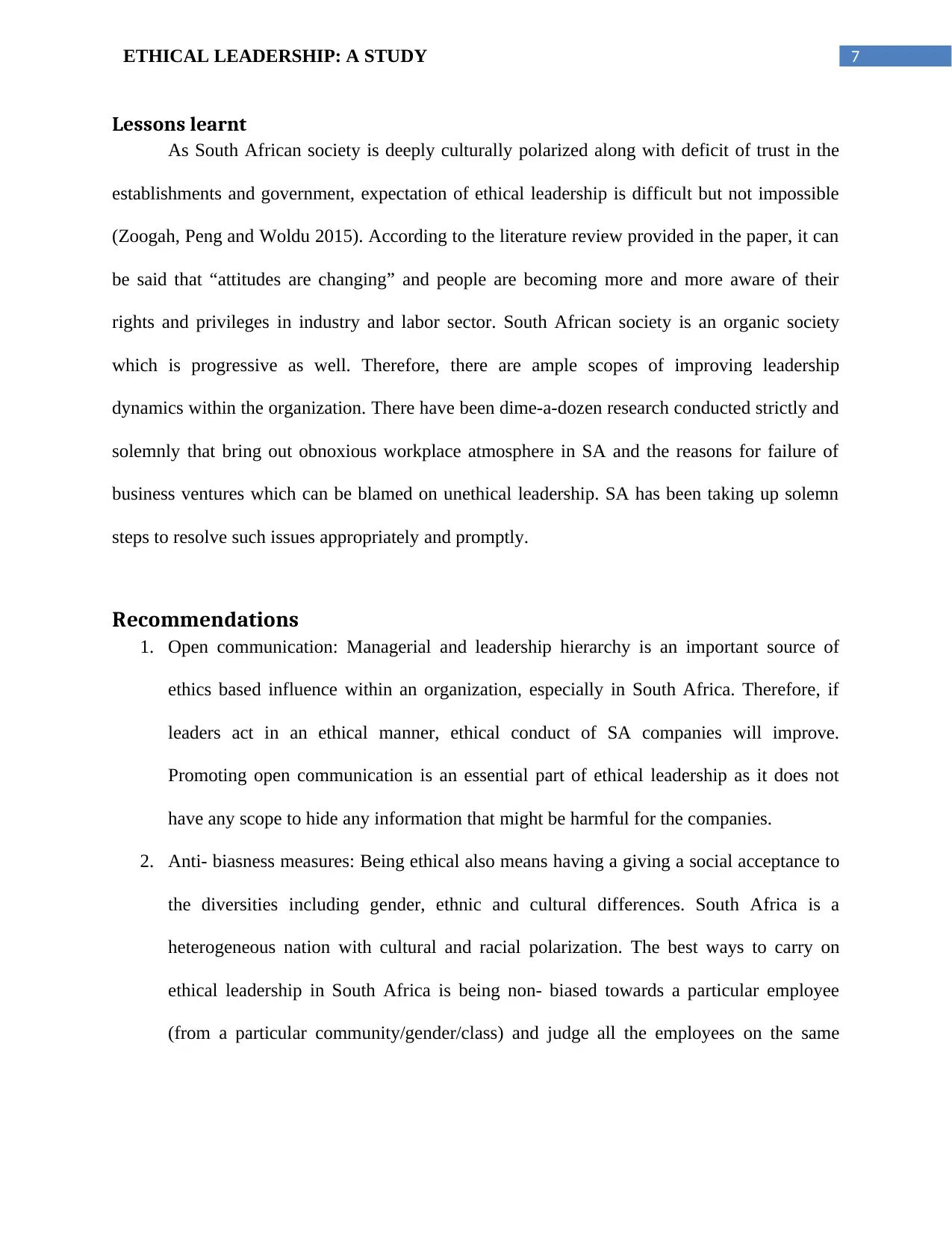
7ETHICAL LEADERSHIP: A STUDY
Lessons learnt
As South African society is deeply culturally polarized along with deficit of trust in the
establishments and government, expectation of ethical leadership is difficult but not impossible
(Zoogah, Peng and Woldu 2015). According to the literature review provided in the paper, it can
be said that “attitudes are changing” and people are becoming more and more aware of their
rights and privileges in industry and labor sector. South African society is an organic society
which is progressive as well. Therefore, there are ample scopes of improving leadership
dynamics within the organization. There have been dime-a-dozen research conducted strictly and
solemnly that bring out obnoxious workplace atmosphere in SA and the reasons for failure of
business ventures which can be blamed on unethical leadership. SA has been taking up solemn
steps to resolve such issues appropriately and promptly.
Recommendations
1. Open communication: Managerial and leadership hierarchy is an important source of
ethics based influence within an organization, especially in South Africa. Therefore, if
leaders act in an ethical manner, ethical conduct of SA companies will improve.
Promoting open communication is an essential part of ethical leadership as it does not
have any scope to hide any information that might be harmful for the companies.
2. Anti- biasness measures: Being ethical also means having a giving a social acceptance to
the diversities including gender, ethnic and cultural differences. South Africa is a
heterogeneous nation with cultural and racial polarization. The best ways to carry on
ethical leadership in South Africa is being non- biased towards a particular employee
(from a particular community/gender/class) and judge all the employees on the same
Lessons learnt
As South African society is deeply culturally polarized along with deficit of trust in the
establishments and government, expectation of ethical leadership is difficult but not impossible
(Zoogah, Peng and Woldu 2015). According to the literature review provided in the paper, it can
be said that “attitudes are changing” and people are becoming more and more aware of their
rights and privileges in industry and labor sector. South African society is an organic society
which is progressive as well. Therefore, there are ample scopes of improving leadership
dynamics within the organization. There have been dime-a-dozen research conducted strictly and
solemnly that bring out obnoxious workplace atmosphere in SA and the reasons for failure of
business ventures which can be blamed on unethical leadership. SA has been taking up solemn
steps to resolve such issues appropriately and promptly.
Recommendations
1. Open communication: Managerial and leadership hierarchy is an important source of
ethics based influence within an organization, especially in South Africa. Therefore, if
leaders act in an ethical manner, ethical conduct of SA companies will improve.
Promoting open communication is an essential part of ethical leadership as it does not
have any scope to hide any information that might be harmful for the companies.
2. Anti- biasness measures: Being ethical also means having a giving a social acceptance to
the diversities including gender, ethnic and cultural differences. South Africa is a
heterogeneous nation with cultural and racial polarization. The best ways to carry on
ethical leadership in South Africa is being non- biased towards a particular employee
(from a particular community/gender/class) and judge all the employees on the same
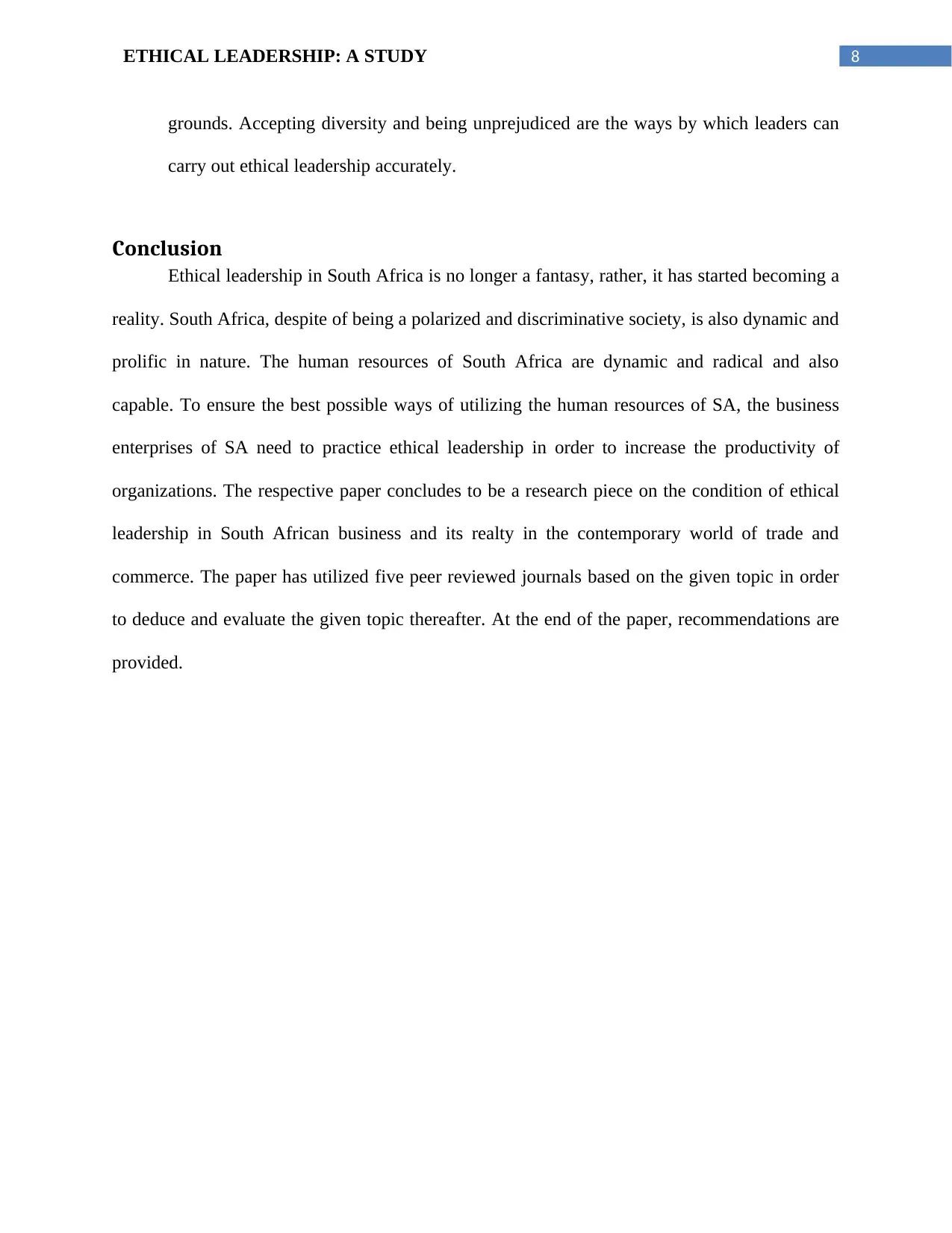
8ETHICAL LEADERSHIP: A STUDY
grounds. Accepting diversity and being unprejudiced are the ways by which leaders can
carry out ethical leadership accurately.
Conclusion
Ethical leadership in South Africa is no longer a fantasy, rather, it has started becoming a
reality. South Africa, despite of being a polarized and discriminative society, is also dynamic and
prolific in nature. The human resources of South Africa are dynamic and radical and also
capable. To ensure the best possible ways of utilizing the human resources of SA, the business
enterprises of SA need to practice ethical leadership in order to increase the productivity of
organizations. The respective paper concludes to be a research piece on the condition of ethical
leadership in South African business and its realty in the contemporary world of trade and
commerce. The paper has utilized five peer reviewed journals based on the given topic in order
to deduce and evaluate the given topic thereafter. At the end of the paper, recommendations are
provided.
grounds. Accepting diversity and being unprejudiced are the ways by which leaders can
carry out ethical leadership accurately.
Conclusion
Ethical leadership in South Africa is no longer a fantasy, rather, it has started becoming a
reality. South Africa, despite of being a polarized and discriminative society, is also dynamic and
prolific in nature. The human resources of South Africa are dynamic and radical and also
capable. To ensure the best possible ways of utilizing the human resources of SA, the business
enterprises of SA need to practice ethical leadership in order to increase the productivity of
organizations. The respective paper concludes to be a research piece on the condition of ethical
leadership in South African business and its realty in the contemporary world of trade and
commerce. The paper has utilized five peer reviewed journals based on the given topic in order
to deduce and evaluate the given topic thereafter. At the end of the paper, recommendations are
provided.
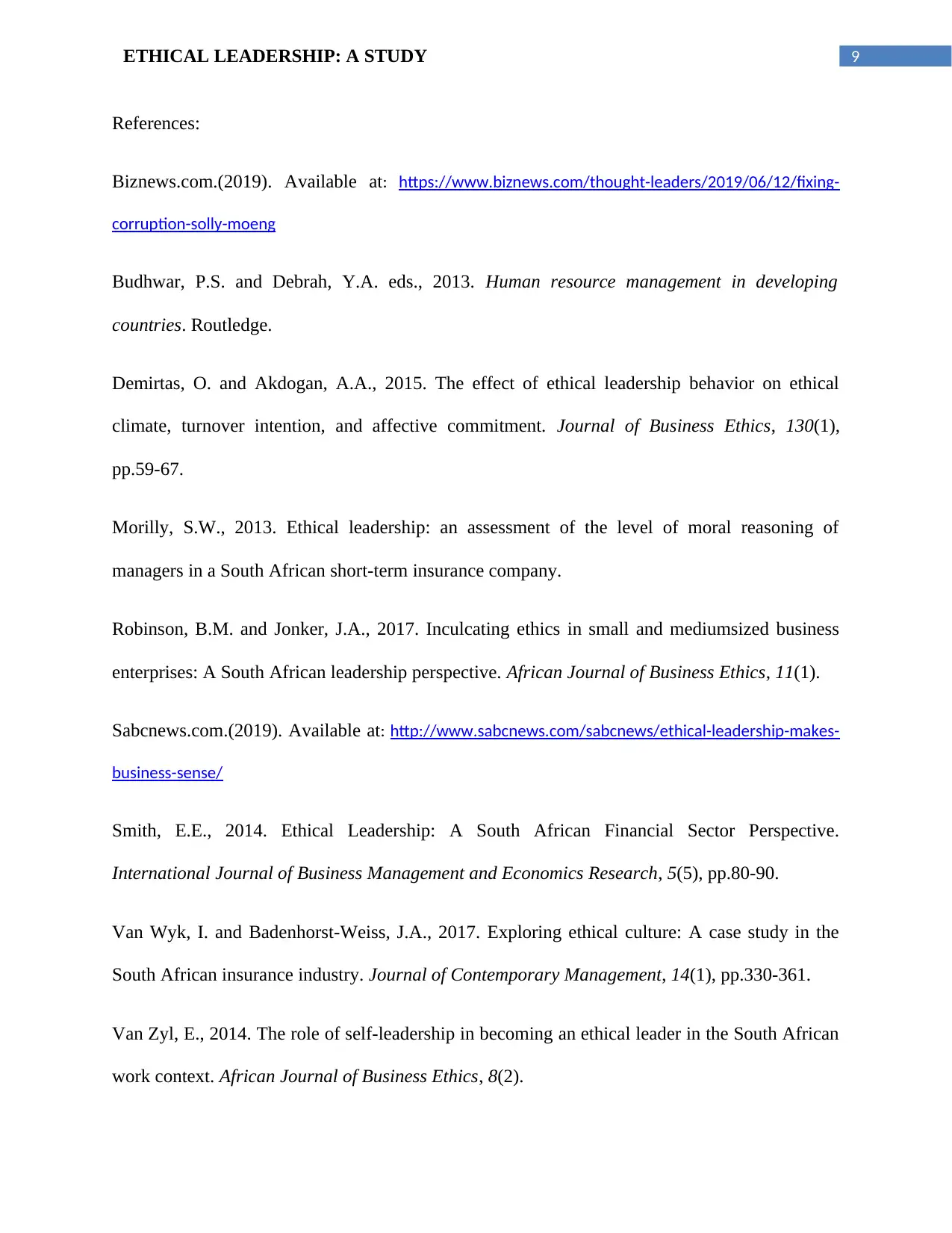
9ETHICAL LEADERSHIP: A STUDY
References:
Biznews.com.(2019). Available at: https://www.biznews.com/thought-leaders/2019/06/12/fixing-
corruption-solly-moeng
Budhwar, P.S. and Debrah, Y.A. eds., 2013. Human resource management in developing
countries. Routledge.
Demirtas, O. and Akdogan, A.A., 2015. The effect of ethical leadership behavior on ethical
climate, turnover intention, and affective commitment. Journal of Business Ethics, 130(1),
pp.59-67.
Morilly, S.W., 2013. Ethical leadership: an assessment of the level of moral reasoning of
managers in a South African short-term insurance company.
Robinson, B.M. and Jonker, J.A., 2017. Inculcating ethics in small and mediumsized business
enterprises: A South African leadership perspective. African Journal of Business Ethics, 11(1).
Sabcnews.com.(2019). Available at: http://www.sabcnews.com/sabcnews/ethical-leadership-makes-
business-sense/
Smith, E.E., 2014. Ethical Leadership: A South African Financial Sector Perspective.
International Journal of Business Management and Economics Research, 5(5), pp.80-90.
Van Wyk, I. and Badenhorst-Weiss, J.A., 2017. Exploring ethical culture: A case study in the
South African insurance industry. Journal of Contemporary Management, 14(1), pp.330-361.
Van Zyl, E., 2014. The role of self-leadership in becoming an ethical leader in the South African
work context. African Journal of Business Ethics, 8(2).
References:
Biznews.com.(2019). Available at: https://www.biznews.com/thought-leaders/2019/06/12/fixing-
corruption-solly-moeng
Budhwar, P.S. and Debrah, Y.A. eds., 2013. Human resource management in developing
countries. Routledge.
Demirtas, O. and Akdogan, A.A., 2015. The effect of ethical leadership behavior on ethical
climate, turnover intention, and affective commitment. Journal of Business Ethics, 130(1),
pp.59-67.
Morilly, S.W., 2013. Ethical leadership: an assessment of the level of moral reasoning of
managers in a South African short-term insurance company.
Robinson, B.M. and Jonker, J.A., 2017. Inculcating ethics in small and mediumsized business
enterprises: A South African leadership perspective. African Journal of Business Ethics, 11(1).
Sabcnews.com.(2019). Available at: http://www.sabcnews.com/sabcnews/ethical-leadership-makes-
business-sense/
Smith, E.E., 2014. Ethical Leadership: A South African Financial Sector Perspective.
International Journal of Business Management and Economics Research, 5(5), pp.80-90.
Van Wyk, I. and Badenhorst-Weiss, J.A., 2017. Exploring ethical culture: A case study in the
South African insurance industry. Journal of Contemporary Management, 14(1), pp.330-361.
Van Zyl, E., 2014. The role of self-leadership in becoming an ethical leader in the South African
work context. African Journal of Business Ethics, 8(2).
Secure Best Marks with AI Grader
Need help grading? Try our AI Grader for instant feedback on your assignments.
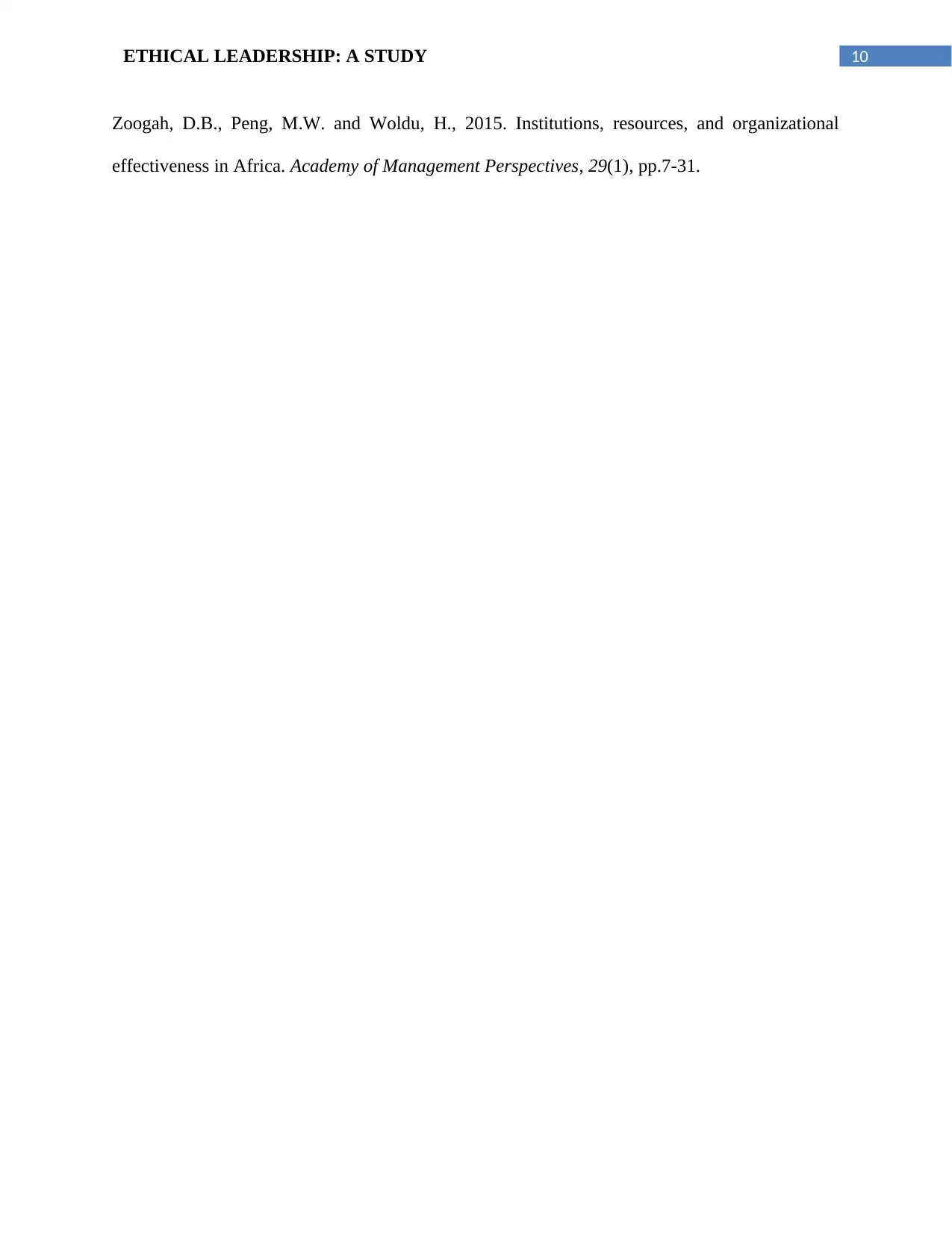
10ETHICAL LEADERSHIP: A STUDY
Zoogah, D.B., Peng, M.W. and Woldu, H., 2015. Institutions, resources, and organizational
effectiveness in Africa. Academy of Management Perspectives, 29(1), pp.7-31.
Zoogah, D.B., Peng, M.W. and Woldu, H., 2015. Institutions, resources, and organizational
effectiveness in Africa. Academy of Management Perspectives, 29(1), pp.7-31.
1 out of 11
Related Documents
Your All-in-One AI-Powered Toolkit for Academic Success.
+13062052269
info@desklib.com
Available 24*7 on WhatsApp / Email
![[object Object]](/_next/static/media/star-bottom.7253800d.svg)
Unlock your academic potential
© 2024 | Zucol Services PVT LTD | All rights reserved.





